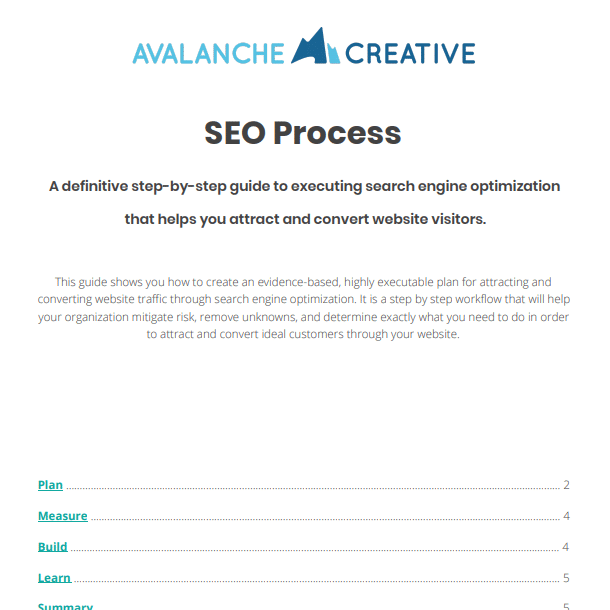How SEO Can Boost Your Rebranding Marketing Strategy
Category: Search Strategy | Tags:
Rebranding is sometimes necessary, but as any marketer, SEO expert, content creator, salesperson, operations manager, and practically anyone else at your company can tell you—it can also be a huge pain. That goes double if you go into it without a good rebranding marketing strategy that factors in SEO.
But how do you rebrand a business without losing the hard work you’ve put into your SEO efforts? Let’s explore how to put SEO at the forefront of your rebranding marketing strategy so your business can continue to grow for the long term.
How SEO Can Help Your Marketing Rebranding Strategy
Done right, SEO can help you rebrand seamlessly and continue to attract new business to your company. Here are some of the ways a good SEO strategy plays into your overall rebranding efforts.
Brings in New Customers
Unless you’re one of the few companies whose products have become interchangeable with the name of the product itself, you shouldn’t necessarily rely on your brand alone. Fortunately, by including relevant keywords in your website content, you can attract new customers to your website without having to rely on your branding at first.
People use search engines to find answers to their problems and questions—just think of the last time you searched for restaurants or plumbers or a new piece of furniture. Chances are, you used Google at least once during one of those searches.
By understanding how people use search engines and the keywords they use when they’re searching for them, you can continue to attract new customers
Increases Visibility
Your brand needs as much support as it can get when you’re in the early stages of a rebrand. By continuing to add blog posts and updating website pages throughout the rebranding process, you can establish credibility with Google—and with people who might not have been aware of your brand before the rebrand.
This will help give your SEO the boost it needs and help you attract organic traffic, allowing more people to find your products or services over time.
Develops Brand Authority
Your marketing team has worked for years to help you build your brand authority. A rebrand doesn’t have to throw that off course at all.
Done right, a good SEO strategy can help you establish and develop your brand’s authority and subject matter expertise. In turn, you’ll be able to show potential customers that your brand is one they can trust when they’re ready to look for services like yours.
Creates Reusable Content
Your marketing team works their hearts out every single day to create viable content that converts. One way to get more mileage out of your content is to set it up to be repurposed and reused easily.
There are several ways SEO can help you do this:
- Addressing different subtopics on the same overarching subject
- Allowing you to focus on similar, related keywords across multiple pieces of content
- Creating backlinks to your main website from social media and other channels where you reuse the content
Targets Local Customers
For brands that rely more upon their local presence, SEO makes it easier to connect with customers in the areas they serve. They do this by creating tailored content for the locations in their service area, including location-based pages for specific states and cities.
This is also a great chance to update your Google Business Profile listings. In addition to changing the branding and imagery on the profile itself, you can also post new information about your business’s rebrand and what led you to it. This helps personalize your brand and helps build a relationship with any customers who might be looking for your old brand name online.
How to Navigate a Rebranding Marketing Strategy with SEO in Mind
Rebranding your website’s SEO takes several steps. Here is what we typically recommend when we have a client undergoing a merger, acquisition, or rebranding.
Conduct Competitive Analysis
A competitive analysis allows you to identify keywords that your direct competitors are ranking for so you can tailor your strategy accordingly—along with finding potential opportunities they may have missed.
At a glance, the process of conducting a competitive analysis looks like this:
- Choosing keywords: Keyword research should be your first step when you’re looking for how rebranding your website will affect SEO. That’s especially true for competitive analyses. Be sure to look at keyword intent, search volume, and competitiveness when choosing the keywords you want to target.
- Comparing rankings: How are your direct competitors ranking for the keywords you chose compared to you? Some of the results you find may surprise you, and you may find opportunities to outrank them during your rebranding process.
- Checking content: If your competitors are ranking for a keyword that you haven’t yet ranked for, this is your chance to see what type of content they’re using to rank so highly. This will help you determine the best content to rebrand and refresh.
- Creating stronger content: Once you know what your competitor’s content is like, that’s your opportunity to create better content that uses better SEO tactics.
Improve the Website Structure
This generally involves auditing and overhauling your sitemap. Every piece of content on your website should contribute to its overall structure, building upon the most basic topics with different related subtopics that visitors can use to educate themselves.
For websites that have been around for a while and have a sprawling structure with hundreds of pages that aren’t connected to each other, this can be a bit of an undertaking. An SEO agency can take care of the heavy lifting though, helping you restructure your site and update the most valuable content first. This makes it easier for Google’s spider-like crawlers to read and index your website. Then, it can more easily show your site to people who are searching for services like yours.
Revise Your Content
Content that was published in 2017 is now seven years old—or 87 years old in SEO years. While the information you originally added to your content might be valuable, a lot has probably changed about your brand in that time.
Rebranding is a prime opportunity to update your content. Not only can you take this as a chance to replace any instances of your old brand name or other elements, but you can also add relevant information, update it with new imagery or videos, and intersperse it with keywords relating to the topic of the content at hand.
Update URLs & Metadata
This is one of the most important parts of your rebranding strategy. You’ll want to make sure your domain and URLs are updated to reflect your new branding. This is also a good opportunity to update and optimize your metadata. However, it can be a delicate process.
Done incorrectly, your SEO could suffer as the domain authority you built doesn’t easily transfer on its own. However, an agency with SEO expertise can help you update your URLs to minimize the impact your rebrand may have on your domain authority.
Check Backlinks
Not all backlinks are created equal. Some industry-specific directories and posts to well-established websites can be worth their weight in gold. Others that are on seedier directories, artificial pages that anyone can get on for a price, and click farms that don’t actually have value can ultimately hurt you.
That’s why it’s essential for your SEO expert to regularly check your backlinks. On top of helping you establish links with sites you want to associate with your brand, they can also find some of these bad backlinks and take them down to protect your site’s reputation.
Frequently Asked Questions (FAQ)
Does Changing the Domain Name Affect SEO?
Yes, changing your domain name impacts SEO. This is because Google and other search engines indexed your pages on the existing domain, so it won’t recognize the new domain right away.
However, there are ways to minimize the negative impacts of your domain rebrand. Some of the most common tactics include:
- Migrating all the content from the old domain to the new one
- Setting up 301 redirects to tell Google your site has permanently moved to the new URL
- Using the same keyword optimization tactics you used when creating the original content—or using better ones
- Continuing to acquire high-quality backlinks to your new site
How Long Does SEO Take to Work?
Good things come to those who wait. Typically, it takes several months of working with a rebranding SEO agency to start seeing tangible results for your website. Sometimes a good SEO expert can identify some low-hanging fruit to help you start ranking for specific keywords.
However, SEO is about the long game. Google’s algorithm takes time to recognize what you’re doing when changing your domain name for SEO and contributing to your site as other rebranding tactics. Once it realizes you’re making these updates in earnest though, it’ll start to rank your pages accordingly and place them higher in the search results.
The other nice thing about SEO, however, is that once your page starts to rank, you can typically keep your brand in that position for months or years to come.
How Can an SEO Agency Help?
SEO agencies know some of the tricks and tips that help your website stand out on search engines. Even more, they know how to minimize the negative impacts of migrating your site to a new domain and helping you continue to grow while your rebrand is taking effect using Google’s best practices.
A good SEO agency can help you lay the groundwork for a site that will continue to grow and attract high-quality leads for years to come.
Share this article:
The Avalanche Email: Fun. Simple. Educational. No Selling.
Learn Result-focused SEO & Content
Join over 2,272+ others who get one email every Wednesday with simple instructions on how to get more website traffic and leads through SEO and content marketing. (Learn more about the email)
Stay Current in an Ever-Changing Market
Ready to Rebrand?

Is there a rebrand on the horizon for your company?
We’ll help you figure out the right questions to ask to determine if now’s the right time for a fresh start.
Related Resources

Download our SEO Process.
Keep Learning
Creating the Perfect SEO Content Template in Google Docs
Learn how to create an SEO Content Templates in Google Docs to help drive new traffic to your website from the search engines. SEO Content Templates provide specific recommendations and directives for creating new content on your website with the purpose of improving your SEO.
How To Show Up in Gemini (And Win More Local Jobs)
Show up in Gemini when homeowners search for landscaping services. Build the right signals on Google and your website to win more qualified local jobs.
How to Run Google Ads for Landscapers: A Complete Guide
Learn how to set up Google Ads for landscapers, attract qualified leads, and win more local jobs with this step-by-step guide.
🏔️ Watering > Planting New Seeds
Your next marketing win may already be on your site. Learn how to optimize existing pages for better rankings, traffic, and results.
The Recipe vs. The Meal
Your customers buy the experience, not the product. Discover a simple way to shift your message from ingredients to the full meal.
What’s the Best CMS for Landscaping Businesses?
Compare the best website platforms for landscapers. Learn the pros and cons of Wix, Squarespace, and WordPress, and why WordPress is best for long-term SEO.


![Digital Marketing: Is SEO Still Worth Your Attention? [Infographic]](https://avalanchegr.com/wp-content/uploads/2019/09/7-trends-image-150x150.jpg)


